Investigative journalist Tunca Ogreten has spent over 300 days in pre-trial detention in Turkey for an article exposing links between the country’s Energy Ministry and a company transporting Northern Iraqi oil from the Kurdish zone through Turkey
We present the report that landed him in prison: an expose of how controversial energy deals in Turkey are run through a close family member of President Erdogan
.jpg)
In 2016, investigative journalist Tunca Öğreten published an article that documents the involvement of Turkish Energy Minister (and President Recep Tayyip Erdoğan’s son-in-law) Berat Albayrak in the shipping of Kurdish oil through Turkey, and onward to the world’s energy markets.
His investigation was based on company records and Albayrak’s emails, leaked by Marxist hacker collective, RedHack. Öğreten was among a handful of journalists with whom RedHack shared the emails.
When the article was published, Albayrak’s lawyers asked the Turkish courts to censor the content. Many other articles which cited the emails, revealing corruption and malpractice in government, suffered a similar treatment.
On 25 December, police officers conducted a dawn raid on Öğreten’s house, along with five other journalists who reported the leak: Ömer Çelik and Metin Yoksu (from DİHA News Agency — shut down by the government), Mahir Kanaat (from daily BirGün), Eray Sargın (chief editor of news website Yolculuk) and Derya Okatan (editor at ETHA News Agency).
After spending 24 days in detention without facing trial, Öğreten, Çelik and Kanaat were jailed on ‘terrorism’ charges. The others were released on bail, pending trial.
Once the three journalists had spent seven months in pretrial detention, the prosecutor submitted an indictment, accusing the journalists of membership of a terrorist organisation, and making propaganda for a terrorist organisation. Tunca Öğreten was accused of breaching information systems for reviewing the emails on his computer.
The primary evidence in the eight-page indictment is a Twitter message group where a RedHack affiliated account allegedly shared access to the emails with journalists. For the prosecutor, the only ‘proof’ regarding journalists’ membership to a terrorist organisation is who the journalists ‘follow’ on Twitter. The only evidence for the accusation of propaganda for a terrorist organisation are the journalists’ 19 tweets, 13 of which are news titles or updates on ongoing events.
Based on this indictment, Tunca Öğreten and other journalists are due to have their first hearing on 24 October. They have stayed over 300 days in pretrial detention.
Currently there are 170 journalists in Turkish jails, many accused of “terrorism” for the news articles they published, or opinions they shared on Twitter.
One year on, we are publishing the English translation of Tunca Öğreten’s article about Turkish Energy Minister Albayrak’s involvement in the Kurdish oil trade.
For more about the current situation on this issue, you can read our article 'Turkey Energy Deals in Iraqi Kurdistan helped Open door to Kurdish Independence'
- Turkey’s Energy Minister Berat Albayrak had the final say on Powertrans, the company that transports oil produced by the Kurdish Regional Government, according to the RedHack email cache
- Albayrak gave approval to everything in Powertrans - from employment of key personnel to daily food expenses
By Tunca Öğreten
Originally published in Diken on 30 September 2016
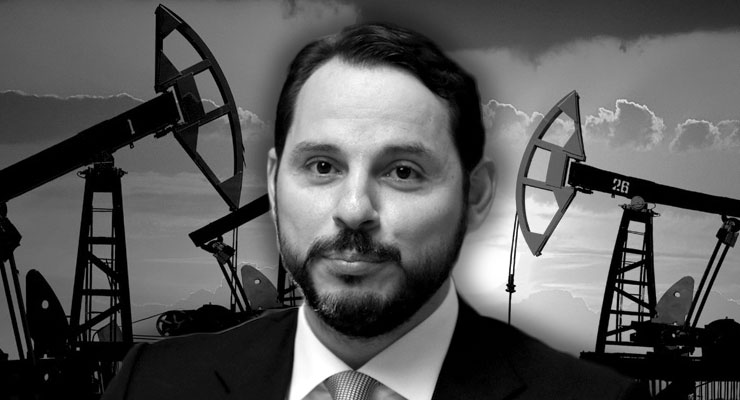
In his book ‘Potus and Beyefendi’, Turkish newspaper Hürriyet’s Washington DC correspondent Tolga Tanış revealed that a company named Powertrans was authorised in 2011 to transport oil produced by the Kurdistan Regional Government of Iraq.
According to the documents published, President Erdogan’s son-in-law Berat Albayrak was one of the shareholders of Powertrans.
Based on Tanış’s book, Turkish newspaper Cumhuriyet published an article on 12 March 2015, entitled “Oil favours to Erdoğan’s son-in-law, the new Energy Minister”.
The news article, later censored, detailed the following:
“On the documents revealed, Turkey’s rapprochement with the Kurdish Regional Government has financial significance for a few ‘selected companies’.
“Erdoğan’s cabinet, at their first meeting after the 2011 general election [which Erdogan’s party, the AKP, won in a landslide], issued a privileged order for the transport of oil from the region.
“The company which benefited the most was Powertrans, whose owners were not public. The documents show that the company belonged to Çalık Group. All the business decisions about the foreign owners of Powertrans, Grand Fortune Ventures and Lucky Ventures, were signed by Sovereign Trust Advisors, but they were taken by Çalık Holding executives when Erdoğan’s son-in-law Berat Albayrak was the [Çalık] CEO.”
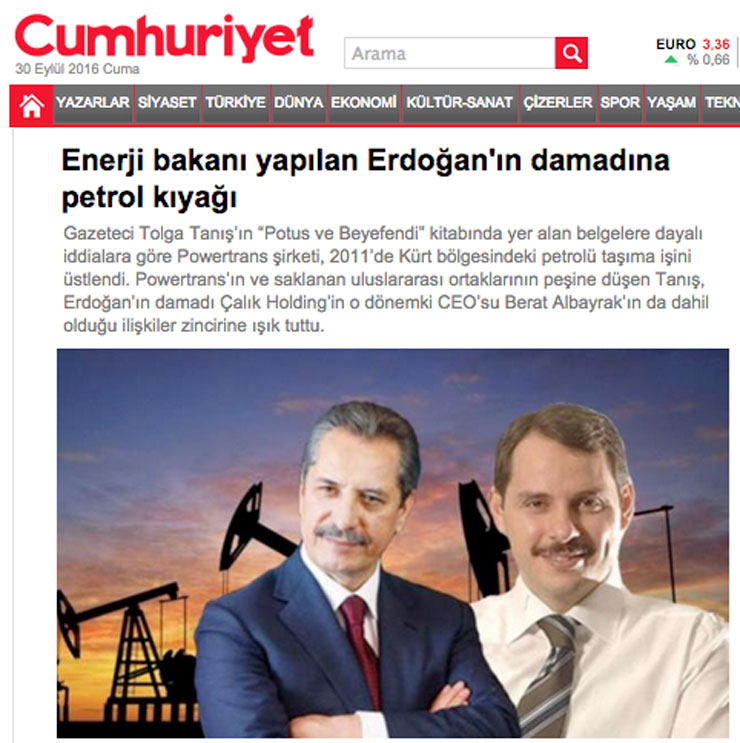
After the publication, Albayrak’s lawyers claimed he had no links to the company and filed a law suit against Cumhuriyet’s chief editor Can Dündar.
When Powertrans was founded, Berat Albayrak did not hold a ministerial position. But after he was appointed Energy Ministry, he released a statement on the Ministry’s website.
“Companies that applied for oil trade (petroleum, related products, natural gas or electricity) based on the contract laid out by the Northern Iraq Regional Government had received licences according to regulations of the government bodies.
"The application by PowerTrans was evaluated and approved by the Ministry of Customs and Trade according to international trade and Turkish regulations, on the condition that the company meets all the criteria completely. As a state governed by the rule of law, it is not possible for our government to give privileges to any person, company or institution illegally or immorally.”
In one of the correspondences, an employee named B.Y. [name redacted by reporter] asks Albayrak’s approval for the personnel employed and the food the workers receive.
In the email dated 20 June 2013, B.Y. asks “Powertrans wants the travel allowances to be reconsidered... and the food allowances to be increased by 5 Turkish Lira in parallel with other companies in the proximity [of ours]. Submitted for your approval.”
In another email leaked by RedHack, date unknown, B.Y. asks: “Dear Mr. Albayrak, the personnel you approved are appointed as follows: E.Y. as senior advisor to trade department with 1,500 Turkish Lira salary, M.E. as senior advisor to logistics department with 1,500 Turkish Lira salary…”
The email dump also contains the correspondence between Albayrak and D.A.İ. [name redacted by the reporter] ‘Iraq Regional Manager’ of Powertrans. In one email, D.A.İ. says: “After the Energy Ministry allowed gas and diesel oil for private companies, the ministry’s pressure on us is decreased. The final destination for the most part of the oil we transport is the Zaho region.”
D.A.İ. also warns Albayrak that if Barzani steps down from his presidency, their business may suffer.
He says: “Politically speaking, President Masoud Barzani’s term will soon be over. Previously, his term was extended by the decision of the Parliament. The new president was expected to be from the Iran-ally Goran (Change) Party, but after the meeting with Goran leaders with Iranian officials in Sulaymaniyah, they made a statement to support the extension of Masoud Barzani’s presidency.
“According to the intel from local sources, Masoud Barzani’s leave from office would have a huge impact. It is believed that the trade with Turkey would have decreased and the oil trade would have shifted to Iran.”
- Editor of Turkish newspaper Evrensel is under investigation by public prosecutor over allegations he "insulted the President" by republishing an article by The Black Sea on the business dealings of Turkish President Erdogan''s family
- The journalist is under fire for asking the question: “What does the Erdogan family say about these allegations?”
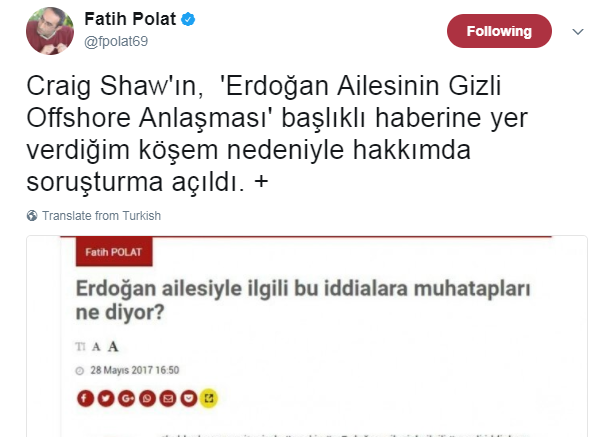
A Turkish prosecutor has launched an investigation into the editor of left-wing daily newspaper, Evrensel, over a report he re-published by The Black Sea about the secret financial affairs of the Erdogan family.
The Turkish President's lawyer lodged a complaint against editor Fatih Polat, who faces the charge of "insulting the president", a criminal offense in Turkey. This is one of the most common legal tools utilized by Erdogan and his government to silence his critics and attack free journalism.
On 28 May, Polat published a column on the paper's website titled “What does the Erdogan family say about these allegations?”. It included the full text of the #MaltaFiles investigation published two days earlier that revealed how two rich Turkish businessmen close to the president paid 25 million USD for an oil tanker secretly owned by the family's offshore company.
The news organisation was ordered by an Istanbul court to remove the column, and they soon filed an appeal against the decision. Two days ago, lawyers announced their motion had been rejected by the Turkish court of appeals.
The legal justification for this was a single line:
“The appeal is to be rejected.”
The news magazine pledged to fight the issue in the Consitutional Court. But now Polat also faces a lenghty criminal process, which could take years to resolve.
- UPDATE: Editor of Turkish newspaper Evrensel is being investigated by public prosecutor over allegations he "insulted the President" by republishing an article by The Black Sea
- The news site is battling a court decision to censor report on business dealings of Turkish President''s family, first published in The Black Sea
- Press freedom faces new attack from the Turkish judiciary as any news story against the Government "faces an immediate takedown order"
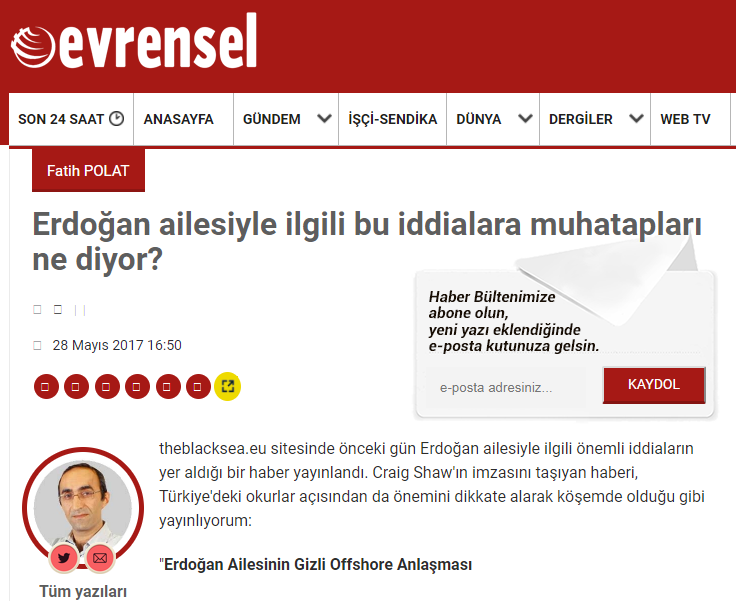
Left-wing Turkish newspaper Evrensel is planning to fight a case in the country’s highest court against a gag order demanding it removes content from its website detailing the The Black Sea's report about the secret business dealings of President Erdogan's family.
On Tuesday 11 July, the publication lost an appeal to keep the article's contents online in a court decision that came with no legal justification.
Evrensel’s lawyer Devrim Avci fears this is setting a dangerous precedent for media freedom.
“Any article, critique, news story that is against the Government faces an immediate takedown order,” she said in a statement. “These orders come so fast, that there will be nothing on the web criticising the Government. This is very dangerous for the freedom of the press.”
The #MaltaFiles story, which details the Erdogan family’s hidden of ownership of a 25 million USD oil tanker, was originally published by EIC members in late May.
Evrensel’s editor, Fatih Polat, republished the article in its entirety with the title “What does the Erdogan family say about these allegations?”
The Istanbul 14th Penal Court of Peace then issued an order shortly after, at the request of a state prosecutor and an as-yet-unknown complainant, forcing the paper to remove the story from its website. Then access to the specific web address of the article was blocked by the Information and Communication Technologies Authority (ICTA), a body which censors the internet in Turkey.
The court provided no details on what legal grounds it took its decision to issue a take down order against Evrensel. It occurred around the time that another Istanbul court issued an order blocking stories on the blacksea.eu site revealing the wealth and assets of Prime Minister Binali Yıldırım’s family. This injunction was made at the request of the Yıldırım family lawyer.
Evrensel challenged the gag order in the Court of Appeal, but on Tuesday 11 July the court denied the media's request to lift the ban.
Again the court gave no arguments for its decision, and instead issued a one-line statement:
“The appeal is to be rejected.”
The website claims that the Turkish courts are greenlighting all requests from Erdogan and his closest political allies - the Justice and Development Party (AKP) - without using legal arguments.
In a statement issued on its website, Evrensel’s lawyer Devrim Avci said:
“With this last verdict, the ruling is final, which means the content will be removed. This is how the courts work, they work to obstruct justice. They rule, then you appeal and they reject your appeal with only one sentence, and without any legal reasoning… If the request comes from the government or people close to the government, these content removal requests are automated. No appeal is ever accepted.”
This is in stark contrast with the official line of the President. In a recent interview with German newspaper Die Zeit, Erdogan stated: “Our judiciary is independent…And we are talking about an independent judiciary, an impartial judiciary. And it does what the constitution of the Turkish Republic and its laws require of it.”
Evrensel says it now plans to take its case to the Constitutional Court, Turkey’s highest judicial body, to argue that the Turkish public has a right to know about the secret financial dealings and wealth of Turkey’s politicians and business elite.
The appeal is an important test case for freedom of speech. It will show the courts’ ability to uphold the law and act independent of Turkey’s president. At the same time, it will offer insight into the current state of the country’s press after years of Erdogan's aggression, which intensified after last year's failed coup against his leadership. Now Turkey is the country with the highest number of jailed journalists in the world.
Turkish investigative journalist Ahmet Sik has been in prison for nearly four months, accused on terrorism charges for tweeting criticisms of the Erdogan-led Government.
Today he was acquitted of a previous charge - but he took the chance in the courtroom to attack Turkey''s controversial justice system
The video in Turkish is here
Ahmet Sik 12 April 2017, OdaTV trial.
Turkish investigative journalist Ahmet Sik attended the last hearing of the OdaTV trial today.
He has been in jail for four months in another case. This trial should take place in the next ten days.
Today in Caglayan Courthouse, after a couple of hours of deliberations, the judge asked for the last words of 13 defendants.
Ahmet Sik said:
“If I said what I am really thinking, it would be the subject of another court case. I am referring to the judiciary who wrote my new indictment. This courthouse has become a symbol of the graveyard of justice. The gravediggers are the judges and prosecutors themselves. At the entrance of this courthouse, you can see the statues of Lady Justice. She is holding scales. Supposedly, these scales are the symbol for justice.
“But it is a fact that the scales don’t weigh anything for those looking for justice in this graveyard.
“Actually, these are scales for judges and prosecutors; on one side, there is honour and integrity, and on the other side there is lack of honour and improbity. For these judges and prosecutors, the latter always weighs more.”
After Ahmet’s words, the judge asked for a recess.
On his return, the judge ruled to acquit all 13 defendants in the OdaTV case.
The case has first started in 2011 when Ahmet and his colleagues were detained for a year, accused of being members of a clandestine terrorist organisation, which was later found out to be fictional.
As Ahmet was leaving the courtroom to be taken back to jail, his supporters were shouting: “Ahmet will be free, he will write again.” Ahmet stopped the military police dragging him outside and turned to the spectators and said:
“This decision should be a lesson for the judges and prosecutors who wrote the [new] indictment against [us]. We will achieve a life where our children’s smiles will be real. This mafia government, this organised evil, will get the ending it deserves. They will face the inevitable.”
Previously, Ahmet has used his time in the courthouse to launch attacks on the Turkish regime. In February he stated:
"We [the journalists] were tried in courts because we refused to bow down to a government which has normalised totalitarianism. We chased the truth. The biggest legacy we inherited is the idea that saying what the powerful wants told is not journalism. The people who taught us this were or are still being punished with jail or exile. When this was not enough, they were silenced with bombs or bullets. The fight waged by the powerful against journalists in order to censor the truth has been going on since the dawn of journalism in this land.
"But this fight is futile. Because, whoever you are, you cannot fight an idea that has truth at its base. If you think you’re fighting it, you should know that you cannot win. You will lose again and again.”
Turkey currently imprisons almost half of all detained journalists worldwide. At least 134 journalist are currently in jail in Turkey, all of them under anti-state charges.
Turkish investigative journalist Ahmet Sik has been in prison for two months, accused on terrorism charges for tweeting criticisms of the Erdogan-led Government. Today he made a rare venture back into the public eye - speaking as a defendant in a different trial
This is what he said

Turkish investigative journalist Ahmet Sik was brought in front of a judge today to defend himself in the OdaTv trial. This is part of an investigation which started in 2011 when he was first detained for a year, accused with membership of a clandestine terrorist organisation, which was later found out to be fictional.
He is currently in jail waiting for the indictment in another case.
On 14 December 2016, the prosecutor wanted Ahmet Sik and other 13 defendants to be acquitted on the grounds of lack of evidence.
Sik refused and asked for extra time to defend himself in front of the court for the last time. The judge had postponed the hearing to 15 February 2017.
“Turkey is a strange country and has experienced many absurdities before now. But there has never been an era where universal democratic norms are thrown out and re-defined to serve the benefit of an organised evil which currently encompasses the country.
"George Orwell’s '1984' is frequently used to describe today’s Turkey, but Orwell would turn in his grave today. If you find this an exaggeration, I will give you a couple of examples.
"I’ll start with the most recent events. The [President Recep Tayyip Erdogan-backed leadership] are trying to sell us a one-man dictatorship as though it is democracy.
"The referendum [on 16 April to grant Erdogan more powers over the legislative branch of power] will be held under unequal circumstances, where everyone is sure there will be fraud, and where a person is branded a terrorist if he says he will vote 'no'.
"And the [leadership] present this referendum to us as the 'will of the nation'. They did not hesitate to turn the country into a bloodbath when the July 2015 general election result threatened their power and the oligarchic system they represent. At the end of the [Kurdish] peace process, the whole country turned into a graveyard.
"They want us to believe this is an advanced democracy and that press freedom is in its best ever era, and they say they have freed us from chains. But national and international organisations tell us: 'Turkey is the biggest prison for journalists in the world'.
"In the last ten years, pro-government loyalists liberally used the terms 'coup' and 'plotter' very liberally. Every anti-government movement was a 'coup' and every dissident was a 'plotter'. In fact, the actual military regimes and coups were welcomed by political Islamists in Turkey.
"The Justice and Development Party (the Erdogan-backed AKP Party) is itself the biggest example of this paradox of the illusion of democracy. They represent the mentality of darkness, but their logo is a light-bulb. They turn the country into a republic paved with cement, while destroying the environment and natural resources, and they call it development. And this trial itself shows their understanding of justice.
"Two of my lawyers are not here today. And not just them. My colleagues Murat Sabuncu, Kadri Gursel, Guray Oz, Turhan Gunay, Hakan Kara, Musa Kart and Onder Celik aren’t here either. They are in jail.
"When evil prevails, we need truth more than ever. Because when facts are written down, evil ceases to be the last word. Not speaking, not remembering and not allowing ourselves to remember is denying ourselves the truth.
"We [the journalists] were tried in courts because we refused to bow down to a government which has normalised totalitarianism. We chased the truth. The biggest legacy we inherited is the idea that saying what the powerful wants told is not journalism. The people who taught us this were or are still being punished with jail or exile. When this was not enough, they were silenced with bombs or bullets. The fight waged by the powerful against journalists in order to censor the truth has been going on since the dawn of journalism in this land.
"But this fight is futile. Because, whoever you are, you cannot fight an idea that has truth at its base. If you think you’re fighting it, you should know that you cannot win. You will lose again and again.”
The trial lasted eight hours. This was expected to be the last hearing in the case. The judge, however, annouced a further hearing for 12 April 2017.
As Ahmet was leaving the courtroom, he turned to his colleagues watching the trial and shouted:
“We will demolish this blockade.”
A list of the mega-mosque projects Turkey is planning across five continents, revealing size, who is financing the construction, and when they are planned for delivery
.jpg)
Location: Moscow, Russia
Investor: The Russian Religious Authority built the rough construction. Financing comes from businessman Suleyman Kerimov (86 million Euro) and the Diyanet Foundation (12 million Euro).
Cost: 109 million Euro
Worshipper capacity: 10,000
Status: Opened in September 2015
Info: Over six floors with two 72m-high minarets, this is the biggest mosque complex in Russia. Diyanet President Mehmet Gormez said: “After the Bolshevik regime that lasted for 100 years (sic), it is very important to build this mosque in Moscow with minarets reaching the sky with a crescent on the top as the symbol of peace.”

Location: Ankara, Turkey
Investor: Presidency’s budget
Cost: Unknown
Worshipper capacity: 3,000
Status: Opened in July 2015
Info: Inside the Turkish President’s new 535 million Euro palace complex, this is 1,200 sqm in size with four 60-meter-high minarets.
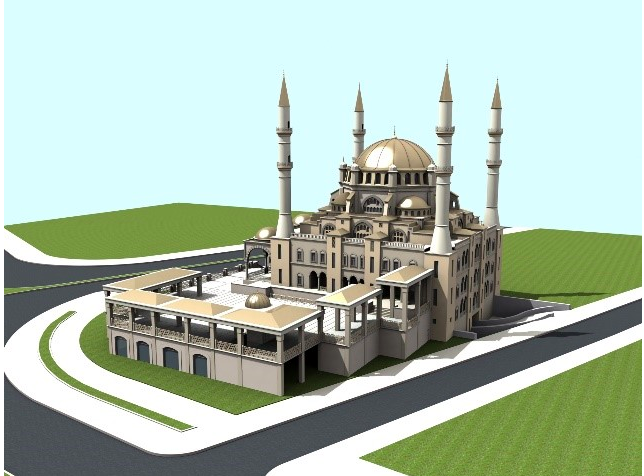
Location: Corum, Turkey
Cost: 5.2 million Euro
Investor: Presidency of Diyanet, Diyanet Foundation, Corum Municipality.
Worshipper capacity: 3,000
Status: Opened in June 2015
Info: Designed as a copy of the 16th Century Selimiye Mosque in Edirne, Turkey, buily by the master architect of the Ottoman rulers, Mimar Sinan. This is the fifth biggest mosque constructed during the Turkish Republican era (post-1923).
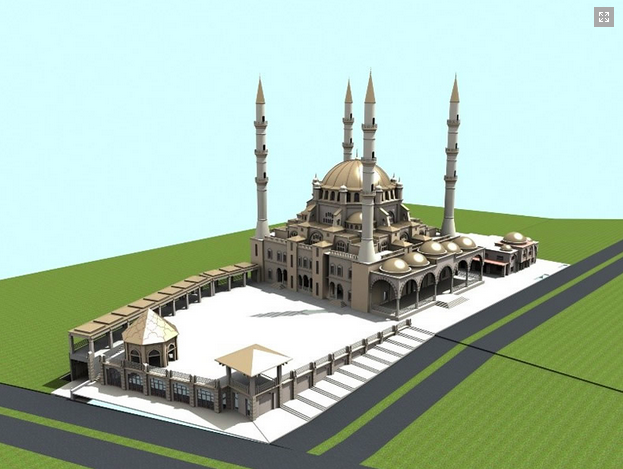
Location: Kirikkale, Turkey
Cost: 10.2 million Euro
Investor: Presidency of Diyanet & Diyanet Foundation
Worshipper capacity: 10,000
Construction status: Opened in May 2015 (by President Erdogan)
Info: Like Corum Central mosque above, this was also designed as a copy of the Mimar Sinan's Selimiye Mosque, leading critics to argue that Turkey is building identikit mosques of its masterpieces, rather than original designs or constructions which are in harmony with their surroundings.
Location: Ankara, Turkey
Investor: Diyanet
Cost: 13 million Euro
Worshipper capacity: 6,000
Status: Opened in 2013
Info: Referred as “the VIP mosque”, this is within the Diyanet HQ, with seperate ablution rooms for state officials.
There is a tunnel between the Diyanet HQ and the mosque, which is only open to high officials and their guests.
During its construction phase, Diyanet constantly instructed mufti offices across Turkey to encourage mosque-goers to donate money for the building.

Location: Istanbul, Turkey
Investor: Donations
Cost: 60 million Euro, possibly higher.
Worshipper capacity: 35,000
Status: Under construction, due mid-2016
Info: Reportedly the biggest mosque in the country since the founding of the Turkish Republic in 1923, this will have six minarets and will be visible from the whole city.
By comparison, only the holy mosque in Mecca (Al-Masjid al-Haram) has seven minarets.
Camlica will also include a library, an art gallery and a conference center for 1,000 people, as well as recreational and sporting facilities. The project is designed by two female architects, Bahar Mızrak and Hayriye Gül Totu.

Location: Duisburg, Germany
Investor: 50 per cent EU and the state of North Rhine Westphalia, 50 per cent DITIB, Diyanet’s sister organisation in Germany.
Cost: seven million Euro
Worshipper capacity: 3,500
Status: Opened in 2008

Location: Cologne, Germany
Investor: Funded by DITIB, Diyanet’s sister organisation in Germany, loans, donations from Muslim associations.
Cost: 34 million Euro
Worshippers: 4,000
Status: Delivered, opening delayed
Info: Over 4,500 sqm, this was designed by Cologne-born church architect Paul Boehm as an industrial spin on the Ottoman architectural style, with glass walls, two 55-meter minarets and a dome, a bazaar, lecture halls and library. Construction is finished, but opening is delayed due to an ongoing court case.
Location: Pristina, Kosovo
Investor: Diyanet Foundation
Cost: Unknown
Worshipper capacity: 7,000
Status: Planning. Construction due to start.
.jpg)
Location: Mitrovica, Kosovo
Investor: Istanbul Bayrampasa Mufti’s office
Cost: Two million Euro
Worshipper capacity: 4,200
Status: Opened in June 2014
Info: Claimed to be the biggest mosque so far in the Balkans with two 48-metre high minarets. Donated by the municipality of Bajram Pasa in Istanbul, as a replacement for the Isa Beg Mosque damaged during Kosovo conflict in 1999.
Location: Bucharest, Romania
Investor: Romania provides land with market value of 3.9 million Euro, Turkey finances construction, most probably done through the Diyanet Foundation.
Cost: Unknown
Worshipper capacity: 1,500
Status: The Romanian Mufti’s office has authorisation for construction to begin
Info: The Mufti states Turkey should finance the project, although the details are not finalised. Construction must be finished by 2018 under a deal with the Bucharest authorities
Location: Kardzhali, Bulgaria
Investor: Likely to be Diyanet
Cost: Unknown
Worshipper capacity: 1,500
Status: Unknown
.jpg)
Location: Tirana, Albania
Investor: Diyanet Foundation
Cost: 30 million Euro
Worshipper capacity: 4,500
Status: Under construction, due in 2017
Info: In May 2015 Erdogan laid the foundation stone on Albania's mega-construction. Called the “biggest mosque in the Balkans”, this is part of an Islamic complex in the heart of Tirana, which is set to house conference and exhibition halls, libraries and museums. Nearby, a "museum of coexistence" will be erected, Erdogan said, adding that it would act as "a symbol of religious tolerance".
Location: Budapest, Hungary
Investor: Diyanet Foundation
Cost: Unknown.
Worshipper capacity: Unknown
Status: No location found.
Info: Designed as an exhibition space, cafe, a four-minaret mosque, cultural centre and guest house, this mosque is still only at the planning stage.
The Budapest city mayor István Tarlós confirmed the question of a mosque “has been raised” with officials at the Turkish Embassy, but they have not yet found a suitable location.
Location: Gorazde, Bosnia and Herzegovina
Investor: Kayseri people in Turkey
Cost: 0.95 million Euro
Worshipper capacity: 1,000
Status: Opened in 2009
Info: In 2013, Diyanet announced that they also will start building, through the Turkish overseas development agency TIKA, a “culture and education complex” next to the mosque. There will be a conference hall, Gorazde Mufti’s office, other halls and a religious high school.
.jpg)
Location: UK, Cambridge University
Investor: Diyanet Foundation/local Cambridge community/Donors
Cost: 23 million Euro, projected cost.
Worshipper capacity: 1,000
Status: Designs completed, under negotiation.
Info: In 2013, Erdogan sent a team from the Diyanet and Diyanet Foundation and Prime Ministerial officials to Cambridge to carry out talks on a mosque in Cambridge. Architects of the London Eye Marks Barfield and Professor Keith Critchlow of the Prince’s School of Traditional Arts were appointed by the Muslim Academic Trust to design what intends to be an “eco-mosque”. At three stories high, this is a mosque which aims to complement rather than overpower its surroundings.
“As yet no construction has commenced,” says Timothy Winter, professor of Islamic studies at the the University of Cambridge. “The land has been purchased and planning permission obtained. Most donations have come from the local Cambridge community, including, pleasingly, many non-Muslim neighbours who are strongly supportive of the plans. We are hoping for significant donations through Diyanet, but the mosque will not be a Diyanet mosque.”
.jpg)
Location: Belarus, Minsk
Investor: Diyanet Foundation
Cost: 4.5 million Euro
Worshipper capacity: 5,000
Status: Planning
Info: There are 30,000 Muslims in Belarus.

Location: Nicosia, TRNC (Turkish republic of Northern Cyprus)
Investor: Diyanet & Diyanet foundation & Association of Cypriot Foundations
Cost: 13.4 million Euro
Worshipper capacity: 7,500
Status: Construction started, due 2016
Info: Turkish Vice Prime Minister Besir Atalay was present during the “laying down foundation” ceremony in 2013. In his speech he said: “this project will be the Cypriot Turk stamp on this island” which is still disputed territory between Cypriot Greeks and Turks.
.jpg)
Location: Simferopol, Occupied Crimea
Investor: Diyanet Foundation
Cost: Unknown
Worshipper capacity: Unknown
Status: Designs completed, under negotiation
Info: The mosque is supposed to have started construction in March 2015, but is suffering delays due to the Russian accession of Crimea, this is still listed on the Diyanet Foundation’s site as an ongoing project.
.jpg)
Location: Utrecht, the Netherlands
Investor: The Netherlands Islamic Union (HDV) Diyanet’s sister organisation in Holland
Cost: 11 million Euro
Worshipper capacity: 2,000
Status: opened in June 2015
Info: The biggest mosque in the Netherlands with the tallest minarets. There are around 200 Turkish mosques in the Netherlands.
Location: Batumi, Georgia
Investor: Diyanet Foundation
Cost: Unknown
Worshipper capacity: Unknown
Status: unknown, local Government still has to find space
Info: In 2013, then Georgian PM Bidzina Ivanishvili said that the local government will find a suitable place for the mosque.
According to an agreement between the two countries, Georgia will restore the ruined Christian monasteries of Oshk and Ishkhan in northeast Turkey. However the nationalist Orthodox community is against the plans saying Georgia doesn’t need another mosque.
In Batumi, where the Ottoman State had ruled for about 300 years and built many mosques, there is one mosque that survives today.
Some local Muslims also want to build a mosque from their own pockets without interference from the Turks.
Location: Gaza, Occupied Territories
Investor: Diyanet Foundation
Cost: 16.4 million Euro
Worshipper capacity: unknown
Status: Planning done, construction due to start
Info: The Diyanet President said in 2014 they would start to rebuild or repair nine Gaza mosques that Israel has demolished, from a total of 70 wrecked places of worship.
.jpg)
Location: Turkistan, Kazakhstan
Investor: Funded by Diyanet and Diyanet Foundation
Cost: 11 million Euro
Worshipper capacity: 2,700
Status: Opened in April 2015
Info: Turkey calls this mosque "a gift" from the Turkish state to the Kazakh people.
At its opening, Diyanet Foundation representative Mazhar Bilgin said: “Except for concrete, steel and sand, everything to build this mosque was brought from Turkey. Marble, stones, electric instruments, paint, rugs, everything. Workers were brought from Turkey… The mosque reflects Central Asian Turkic and Ottoman architecture. We designed and produced everything in Turkey. So it was a beautiful way of showing these people the things we have, but they don’t have here.”
(1).jpg)
Location: Turkistan, Kazakhstan
Investor: Diyanet Foundation & Diyanet
Cost: 2.7 million Euro
Worshipper capacity: Unknown
Status: Planning done, construction to start soon
Info: The mosque is to be built in the university campus.

Location: Bishkek, Kyrgyzstan
Investor: Diyanet Foundation & Diyanet
Cost: 27 million Euro
Worshipper capacity: 6,000
Status: Due for 2017
Info: With four 70-meter high minarets, the Diyanet Foundation says it will be the biggest mosque in Central Asia.
Location: Lanham, Maryland, USA
Investor: Diyanet & Diyanet Foundation
Cost: 90.5 million Euro
Worshipper capacity: 3,000
Status: Open in June 2015
Info: The only mosque in America with two minarets. Built around the corner from Washington D.C.
.jpg)
Location: Cap-Haitien, Haiti
Investor: Diyanet & Diyanet Foundation
Cost: Unknown
Worshipper capacity: 500
Status: Construction started in April 2014.
Location: Havana, Cuba
Investor: Turkey
Cost: Unknown
Worshipper capacity: 3,500
Status: Proposal stage
Info: Turkey and Saudi Arabia are both vying with Cuba to open a mosque on the Caribbean island. Turkey’s proposal is a replica of the 19th century neo-baroque ‘Ortakoy’ Mosque in Istanbul.
Erdogan stated that if Raul Castro accepts Saudi Arabia's plan, he will instead open a mosque on another part of the secular and Communist island, probably in Santiago. There are 9,000 Muslims in Cuba.
Location: Somalia, Mogadishu
Investor: Diyanet Foundation & Diyanet
Cost: 2.7 million Euro
Worshipper capacity: Unknown
Status: 75 per cent completed
Info: This will be the largest mosque in Somalia.
Location: Mogadishu, Somalia
Investor: Turkish Housing Development Fund (TOKI)
Cost: Unknown
Worshipper capacity: 2,300
Status: Opened in January 2015.
Info: The mosque is named after President Erdogan’s mother.

Location: Bamako, Mali
Investor: Diyanet and Diyanet Foundation
Cost: 1.9 million Euro
Worshipper capacity: 750
Status: Opened in December 2013
Info: Diyanet calls this construction the first mosque with “Ottoman architecture” in Africa.
Bamako has a twin town in Turkey, Eyup, which helped initiate the mosque. The Eyup Muftihood wrote on its website about the new mosque:
“It is very meaningful to build a mosque like this in a country where more than 70 per cent of the population’s only dream is to find a job as a servant in a rich person’s house… They, through this mosque, will be free from ignorance and slavery and will embrace the spiritual qualities that have been destroyed… These people will come alive, will stand on their own feet and [Mali] will become a truly independent country.”
This information comes from the local, international and Turkish media and from religious leaders in the respective countries.
However Diyanet and the Diyanet Foundation did not return our attempts to confirm this information, or provide us with new information.
